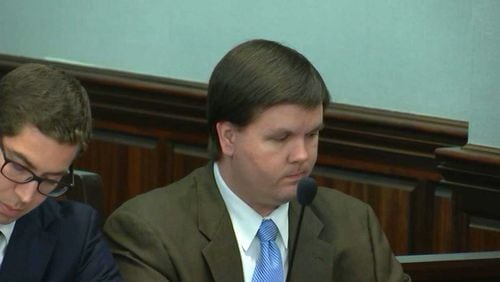Justin Ross Harris intended to kill his 22-month-old son Cooper when he left him locked in the back of his SUV on a June day in 2014, a Glynn County jury concluded Monday.
Harris was convicted on all eight counts, including three separate murder charges, after a long and sensational trial that was more than two years in the making. The defendant took the news with no noticeable emotion; it was a lack of emotion that made him a suspect in his son's murder in the first place, police have testified.
Lead attorney Maddox Kilgore became emotional during a post-trial press conference.
With tears forming in his eyes, Kilgore said the defense team, when leaving the jail after having lengthy meetings with Harris, would say, "My God, he's really not guilty."
"We've got the greatest system of criminal justice in the world. It's the envy of the world and we are so proud to be a part of it," Kilgore said. "Sometimes there are breakdowns in the system. When an innocent person is convicted, there's been some breakdowns. That's what happened here."
In the next months and years, "we're going to get to the bottom of these breakdowns."
"From the moment we met Ross Harris, we have never once, ever ... labored wavered in our absolute belief he's innocent," he said.
After the verdict they went with Harris into the holding cell. They prayed together. "Ross didn't say one word, not one word about what happened in that courtroom. ... He talked about Cooper, he talked about how much he misses him ... he talked about how much he'll continue to miss him."
Lead prosecutor Chuck Boring also spoke after the verdict. When the attorneys went to the jury room for a post-trial discussion, the jurors said they were almost unanimous at the outset.
Boring said that when the attorneys went to the jury room for a post-trial discussion, the jurors said they were almost unanimous at the outset. Those on the fence wanted to discuss the case more fully, and the jury wound up deliberating four days.
When they asked the jurors whether any one thing had persuaded them, they replied that it was the totality of the evidence and no one thing in particular.
Boring said it's hard to accept that someone is capable of such evil. As for Harris, he said, "he has malice in his heart absolutely."
Asked by reporters about whether Harris's ex-wife, Leanna Taylor, was still under investigation in Cooper's death, he said, "We'll leave that to Cobb County police."
Cobb County District Attorney Vic Reynolds said his prosecution team had hoped at first that this was not an intentional act. But Cobb police kept telling prosecutors, "Something is not right about this case, something is very wrong about this case."
Superior Court Judge Mary Staley Clark said Harris would be sentenced later; she has not yet scheduled a sentencing hearing.
Harris stood at the defense table with his lawyers as the jury filed in. Staley Clark had instructed the courtroom to show respect to the jury and let it render its verdict without any disruptions. There were none.
The foreman intoned the verdict on each of the charges separately, using the same words each time.
“Count 1. Malice murder. We find the defendant guilty this 14th day of November 2016,” he read.
“Count 2. Felony murder. We find the defendant guilty this 14th day of November 2016.
"Count 3: Felony murder. We find the defendant guilty . . ."
And so it went until he had read through all eight of the charges. Malice murder, two counts of felony murder, cruelty to children in the first degree, sexual exploitation of children, cruelty to children in the second degree and two counts of dissemination of harmful materials to minors.
Harris faces life in prison on each of the murder charges. The judge could decide not to give him the possibility of parole, meaning he would die in prison; otherwise, he would not become eligible for parole for 30 years (if the three sentences run concurrently; 90 years if they run consecutively).
Jurors did not immediately comment to reporters on their decision.
Throughout the trial, Harris's defense was that he thought he had dropped Cooper off at daycare before reporting to work on June 18, 2014. Father and son had just finished breakfast at Chick-fil-A about four minutes before Harris made the wrong turn: instead of turning left to take Cooper to his Little Apron daycare, he went straight and left his car, and Cooper, in a parking space outside the Home Depot's Treehouse office building. The defense put up expert witnesses who testified that Harris could have forgotten his son was in the car in a very short time.
But the prosecution convinced the jury that Cooper's death was no accident.
“I’m not up here saying he wasn’t conflicted about it,” Boring said in his closing argument. Harris “probably vacillated” about whether he was going to kill Cooper and only “pulled the trigger” when the right moment presented itself.
Boring steadfastly held tp his theory that Harris killed Cooper so he could be free of his family and sleep with as many people as possible.
“Of course, this child was a burden and in the way,” Boring said. By carrying out the murder, “he doesn’t have to worry about his child anymore.”







